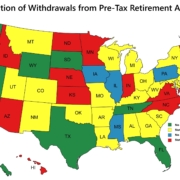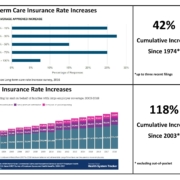The SECURE Act Brings the Biggest Changes to IRAs Since Their Inception – Part 1 – 02/01/20
Money Matters – Skloff Financial Group Question of the Month – February 1, 2020
By Aaron Skloff, AIF, CFA, MBA
Q: How does the SECURE Act impact our estate planning estate planning financial planning and tax planning?
A: The Problem — The SECURE Act radically changes estate planning financial planning and tax planning.
The SECURE (Setting Every Community Up for Retirement Enhancement) Act became effective on January 1, 2020. It secures and enhances the government’s coffers, as it destroys your estate planning, financial planning tax planning and your wealth. Changing the tax laws on existing retirement assets instead of only on new contributions is like changing the rules from three strikes for an out to two strikes for an out in the middle of the World Series. Let’s review the changes, with a focus on IRAs.
RMD Law on Inherited IRAs Prior to 2020. Prior to 2020, you could inherit an Individual Retirement Arrangement (more commonly known as an Individual Retirement Account or IRA) and you would have been subject to required minimum distributions (RMDs) on Inherited Traditional IRAs based on your life expectancy. Withdrawing only RMDs, called a Stretch IRA, allowed you to stretch your distributions over decades and was a powerful financial, estate and tax planning strategy to build and preserve wealth. The smaller your distribution, the smaller your incremental income and the lower the likelihood you would have been bumped into a higher income tax bracket. Spouses were permitted to inherit a Traditional IRA as their own and avoid RMDs until they reached age 70 ½, then begin taking distributions subject to their life expectancy. RMDs were not required on Roth IRAs for the original owner or their spouse if their spouse inherited Roth IRAs as their own. Inherited Roth IRAs were subject to your life expectancy.
RMD Law on Inherited IRAs Starting in 2020. Beginning in 2020, if you inherit an IRA you must complete your distributions within a mere 10 years. This compromises the Stretch IRA by reducing the number of years retirement accounts can remain tax sheltered and increases taxes on distributions over a shorter period. The larger your distribution, the larger your incremental income and the higher the likelihood you will be bumped into a higher income tax bracket. Spouses are permitted to inherit a Traditional IRA as their own and avoid RMDs until they reach age 72, then begin taking distributions subject to their life expectancy. RMDs are still not required on Roth IRAs for the original owner or their spouse if their spouse inherits Roth IRAs as their own. Inherited Roth IRAs must be liquidated within 10 years. IRAs inherited before 2020 are still subject to RMDs based on your life expectancy.
Exceptions to RMD Law on Inherited IRAs Starting in 2020. Surviving spouses, those not more than 10 years younger than the account owner (e.g.: friend, partner, sibling), chronically ill heirs and disabled heirs are classified as ‘eligible designated beneficiaries’, so they can continue to utilize the Stretch IRA based on their life expectancy. Children under the age of 18 can delay RMDs until they reach the age of 18. They must complete distributions within 10 years and liquidate Inherited IRAs by age 28.
Some Positive Changes Starting in 2020. If you turn age 70 ½ in 2020, you can delay RMDs until you turn age 72. If you were already age 70 ½ before 2020, you cannot discontinue RMDs and resume them at age 72. Prior to 2020, if you or your spouse generated earned income you could contribute to both of your Traditional IRAs until age 70 ½. Beginning in 2020, if you or your spouse generate earned income you can contribute to both of your Traditional IRAs regardless of your age. If you have a baby or adopt a child, each parent can withdraw up to $5,000 from retirement accounts (e.g.: 401(k)s or IRAs) without the normal 10% penalty, and withdrawals can be paid back.
SECURE Act Creates Negative Domino Effect. The accelerated distribution schedule of no more than 10 years for Inherited IRAs creates a negative domino effect of larger withdrawals that are added to your existing income. As your income rises you can: be pushed into a higher income tax bracket, which can push you into a higher capital gains rate bracket; can be less eligible for financial aid for your children’s education; have more of your Social Security income subject to income taxes; have to pay more for Medicare premiums, and the list goes on.
The Solution — Modify Your Financial Planning, Estate Lanning and Tax Planning Strategies to Build and Preserve Wealth
All the planning you have done based on IRAs [introduced in 1974], 403(b) [1958] and 401(k)s [1978] must be revisited. Income rates are historically low and may increase in the coming years. Accelerate withdrawals on taxable retirement accounts if you and your beneficiaries (combined) will pay less taxes. Your tax rate on withdrawals in retirement may be lower than your beneficiaries’ tax rates on withdrawals when they are working, as they may be in their peak earnings years and top tax brackets. Change your beneficiaries to those exempt from the 10-year rule or those who earn a low taxable income. Complete Roth IRA conversions if you and your beneficiaries (combined) will pay less taxes. Complete Backdoor Roth IRAs if you and your beneficiaries (combined) will pay less taxes. Use withdrawals to purchase life insurance to create tax-free withdrawals before death, including tax-free long term care benefits, and/or tax-free death benefits. Implement an Insured Asset Conversion Trust to create guaranteed lifetime income (the majority can be tax-free) and return the principal tax-free to beneficiaries.
Action Step — Work Closely with a Registered Investment Adviser (RIA) to Review Your Finances
Work closely with an RIA to review your estate, financial and tax plan to determine if you have the best strategies in place to build and protect your wealth. Implement the solutions described above based on your unique circumstances.
Aaron Skloff, Accredited Investment Fiduciary (AIF), Chartered Financial Analyst (CFA), Master of Business Administration (MBA) is CEO of Skloff Financial Group, a Registered Investment Advisory firm. He can be contacted at www.skloff.com or 908-464-3060.












